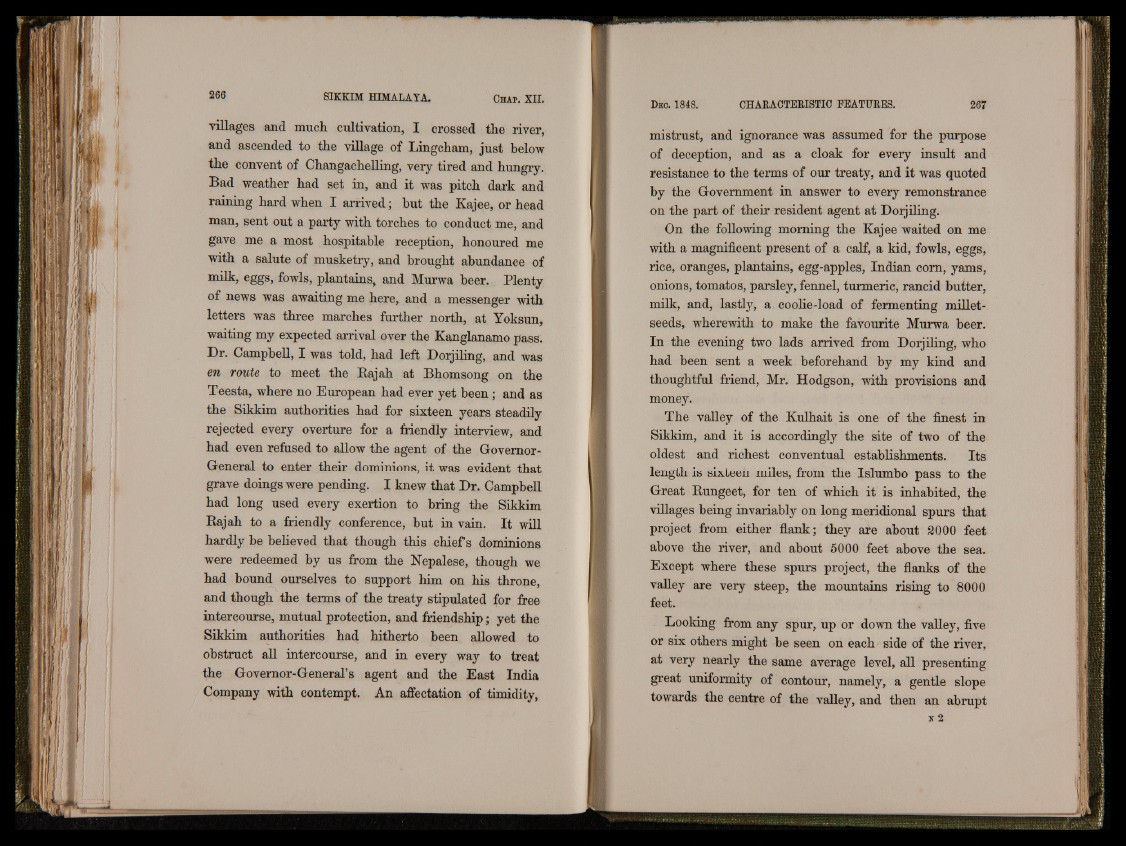
villages and much cultivation, I crossed the river,
and ascended to the village of Lingcham, just below
the convent of Changachelling, very tired and hungry.
Bad weather had set in, and it was pitch dark and
raining hard when I arrived; but the Kajee, or head
man, sent out a party with torches to conduct me, and
gave me a most hospitable reception, honoured me
with a salute of musketry, and brought abundance of
eggs, fowls, plantains, and Murwa beer. Plenty
of news was awaiting me here, and a messenger with
letters was three marches further north, at Yoksun,
waiting my expected arrival over the Kanglanamo pass.
Dr. Campbell, I was told, had left Dorjiling, and was
en route to meet the Rajah at Bhomsong on the
Teesta, where no European had ever yet been; and as
the Sikkim authorities had for sixteen years steadily
rejected every overture for a friendly interview, and
had even refused to allow the agent of the Governor-
General to enter their dominions, it was evident that
grave doings were pending. I knew that Dr. Campbell
had long used every exertion to bring the Sikkim
Rajah to a friendly conference, but in vain. I t will
hardly be believed that though this chiefs dominions
were redeemed by us from the Nepalese, though we
had hound ourselves to support him on his throne,
and though the terms of the treaty stipulated for free
intercourse, mutual protection, and friendship; yet the
Sikkim authorities had hitherto been allowed to
obstruct all intercourse, and in every way to treat
the Governor-General’s agent and the East India
Company with contempt. An affectation of timidity,
mistrust, and ignorance was assumed for the purpose
of deception, and as a cloak for every insult and
resistance to the terms of our treaty, and it was quoted
by the Government in answer to every remonstrance
on the part of their resident agent at Dorjiling.
On the following morning the Kajee waited on me
with a magnificent present of a calf, a kid, fowls, eggs,
rice, oranges, plantains, egg-apples, Indian com, yams,
onions, tomatos, parsley, fennel, turmeric, rancid butter,
milk, and, lastly, a coolie-load of fermenting millet-
seeds, wherewith to make the favourite Murwa beer.
In the evening two lads arrived from Dorjiling, who
had been sent a week beforehand by my kind and
thoughtful friend, Mr. Hodgson, with provisions and
money.
The valley of the Kulhait is one of the finest in
Sikkim, and it is accordingly the site of two of the
oldest and richest conventual establishments. Its
length is sixteen miles, from the Islumbo pass to the
Great Rungeet, for ten of which it is inhabited, the
villages being invariably on long meridional spurs that
project from either flank; they are about 2000 feet
above the river, and about 5000 feet above the sea.
Except where these spurs project, the flanks of the
valley are very steep, the mountains rising to 8000
feet.
Looking from any spur, up or down the valley, five
or six others might be seen on each side of the river,
at very nearly the same average level, all presenting
great uniformity of contour, namely, a gentle slope
towards the centre of the valley, and then an abrupt